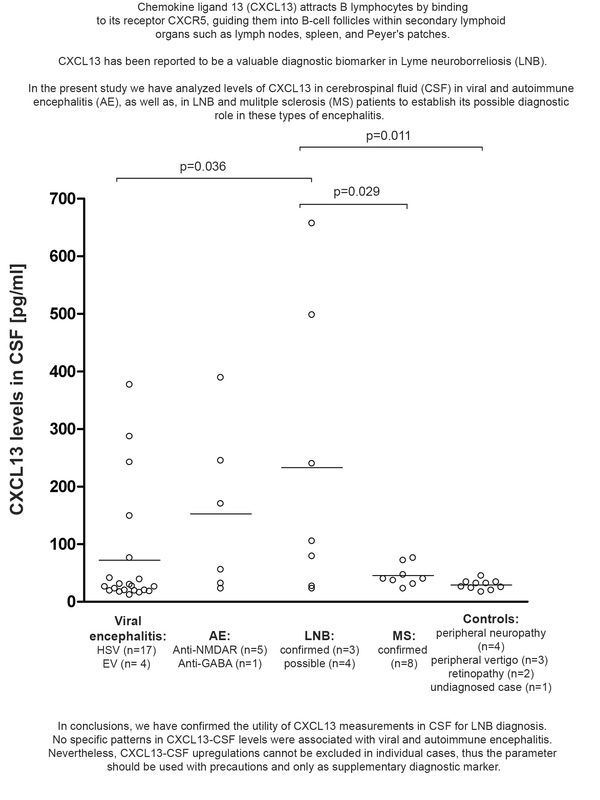Current issue
Archive
Manuscripts accepted
About the Journal
Editorial office
Editorial board
Section Editors
Abstracting and indexing
Subscription
Contact
Ethical standards and procedures
Most read articles
Instructions for authors
Article Processing Charge (APC)
Regulations of paying article processing charge (APC)
INFECTIOUS DISEASES / RESEARCH PAPER
Diagnostic value of cerebrospinal fluid chemokine ligand 13 (CXCL13) levels for viral and autoimmune encephalitis
1
Department of Immunopathology of Infectious and Parasitic Diseases, Medical University of Warsaw, Poland
2
Department of Microbiology, Medical University of Warsaw, Poland
3
Department of Adults Infectious Diseases, Medical University of Warsaw, Poland
4
Department of Neurology, Medical University of Warsaw, Poland
5
Department of Adults Infectious Diseases, Medical University of Warsaw,, Poland
Submission date: 2024-09-24
Final revision date: 2025-04-29
Acceptance date: 2025-07-02
Online publication date: 2025-08-23
Corresponding author
Karol Perlejewski
Department of Immunopathology of Infectious and Parasitic Diseases, Medical University of Warsaw, Pawinskiego 3c, 02-106, Warsaw, Poland
Department of Immunopathology of Infectious and Parasitic Diseases, Medical University of Warsaw, Pawinskiego 3c, 02-106, Warsaw, Poland
KEYWORDS
TOPICS
ABSTRACT
Introduction:
Chemokine ligand 13 (CXCL13) has been reported to be a valuable diagnostic biomarker in Lyme neuroborreliosis (LNB). However, its utility in the diagnostics of viral and autoimmune (AE) encephalitis still remains unclear.
Material and methods:
We have measured CXCL13 concentrations in cerebrospinal fluid (CSF) samples collected from 21 patients with viral encephalitis (17 cases of herpes simplex viral (HSV) and four of enteroviral (EV) encephalitis), six patients with AE (five subjects with antibodies anti-NMDAR and one with anti-GABA) and compared them to those found in patients with LNB (seven subjects), multiple sclerosis (eight cases) and ten controls comprised of subjects without neuroinflammation.
Results:
Patients with neuroinflammation had a mean level of CXCL13-CSF of 105 pg/ml compared to a value of 29 pg/ml for controls. The highest mean level of CXCL13 in CSF was detected in LNB patients (233 pg/ml) whereas the lowest was in controls (29pg/ml). A significant upregulation of CXCL13-CSF levels in LNB patients was determined when compared to viral encephalitis, MS and controls. A positive correlation between the increased levels of chemokine and cell count in CSF was found in all patients (r=0.6496; p<0.0001), as well as, in LNB group when tested alone (r=0.8428; p=0.0173). Positive correlation with CSF protein levels was confirmed in all patients (r=0.7216; p<0.0001), and separately in LNB (r=0.8573; p=0.0137) and AE patients (r=0.8885; p=0.0180).
Conclusions:
The utility of CXCL13 measurements in CSF for LNB diagnosis was confirmed. No specific patterns in CXCL13-CSF levels were associated with viral and autoimmune encephalitis.
Chemokine ligand 13 (CXCL13) has been reported to be a valuable diagnostic biomarker in Lyme neuroborreliosis (LNB). However, its utility in the diagnostics of viral and autoimmune (AE) encephalitis still remains unclear.
Material and methods:
We have measured CXCL13 concentrations in cerebrospinal fluid (CSF) samples collected from 21 patients with viral encephalitis (17 cases of herpes simplex viral (HSV) and four of enteroviral (EV) encephalitis), six patients with AE (five subjects with antibodies anti-NMDAR and one with anti-GABA) and compared them to those found in patients with LNB (seven subjects), multiple sclerosis (eight cases) and ten controls comprised of subjects without neuroinflammation.
Results:
Patients with neuroinflammation had a mean level of CXCL13-CSF of 105 pg/ml compared to a value of 29 pg/ml for controls. The highest mean level of CXCL13 in CSF was detected in LNB patients (233 pg/ml) whereas the lowest was in controls (29pg/ml). A significant upregulation of CXCL13-CSF levels in LNB patients was determined when compared to viral encephalitis, MS and controls. A positive correlation between the increased levels of chemokine and cell count in CSF was found in all patients (r=0.6496; p<0.0001), as well as, in LNB group when tested alone (r=0.8428; p=0.0173). Positive correlation with CSF protein levels was confirmed in all patients (r=0.7216; p<0.0001), and separately in LNB (r=0.8573; p=0.0137) and AE patients (r=0.8885; p=0.0180).
Conclusions:
The utility of CXCL13 measurements in CSF for LNB diagnosis was confirmed. No specific patterns in CXCL13-CSF levels were associated with viral and autoimmune encephalitis.
We process personal data collected when visiting the website. The function of obtaining information about users and their behavior is carried out by voluntarily entered information in forms and saving cookies in end devices. Data, including cookies, are used to provide services, improve the user experience and to analyze the traffic in accordance with the Privacy policy. Data are also collected and processed by Google Analytics tool (more).
You can change cookies settings in your browser. Restricted use of cookies in the browser configuration may affect some functionalities of the website.
You can change cookies settings in your browser. Restricted use of cookies in the browser configuration may affect some functionalities of the website.



